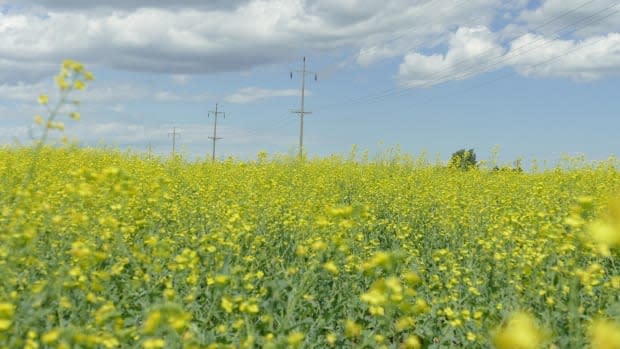Demand for canola biodiesel may be driving canola crush plants in Regina: Professor

Richard Gray says he wasn't surprised to see two canola crush facilities announced within a few days of each other for the Regina area.
The first announcement came from Cargill on Friday and the second by Viterra on Monday.
Gray said the demand for biodiesel may be driving the duelling plant announcements. Biodiesel is a fuel derived directly from living matter — such as canola plants — meant to be a substitute for diesel.
"Canola oil is a cooking oil. It's got lots of energy into it. And basically with a minor amount of processing … you can separate it into biodiesel and other byproducts, and so biodiesel can be made pretty directly from canola oil," said Gray, a professor in the Department of Agricultural and Resource Economics at the University of Saskatchewan.
There are international politics at play as well. Gray said European companies have indicated they would rather use canola for biodiesel than soybeans — as soybean demand puts pressure on the Amazon rainforest and may cause deforestation — or palm oil, which can put pressure on the rainforest in Indonesia.
"It makes sense to locate [plants] near the oil refineries and distribution systems here in Regina," Gray said.

Both Cargill and Viterra have said biofuel will be an aspect of their operations in line with the federal government's clean fuel standards. In 2020, the government proposed rules for the clean fuel standard that producers and distributors would need to follow starting in 2022.
At the time it was proposed, the Environment Canada spokesperson said Canada can and should make the fuels here at home. The aim is to reduce greenhouse gas emissions by reducing the carbon in fuels that people burn to run cars and heat their homes.
The standard is expected to increase the cost of a litre of gasoline by up to 11 cents over the next decade. Officials say it would reduce emissions by nearly 21 megatonnes by 2030.
There's also consumer pressure for companies to go to zero carbon emissions, led by places like California and the west coast states as well as Europe, Gray said. He said he expects it to become a bigger topic now that Joe Biden is president of the United States and has a focus on climate.
Canola price anticipated to increase, environmental impact minimal: Professor
There's currently no indication what the price of canola oil is but there are indicators about the price of soybean oil, Gray said. Soybean oil has increased dramatically within the last year — largely attributed to the clean fuel standard — and it's exceeded 60 cents USD per pound, he said.
Gray said he anticipates canola oil will exceed soybean oil in the future because of the politics and makeup of the oil.
"Chemically [canola oil is] a better source for the biodiesel. But it's also environmentally a better source for the biodiesel. So I think those two things combined, canola oil prices to be at least as high," he said.

David Marit, Saskatchewan's minister of agriculture, said the province is producing 2.5 million tonnes of canola crush and last year the province's farmers grew just over 11 million metric tons of canola. If there continues to be the investments by companies in processing, canola acres are going to grow as well, he said.
He said it's a good investment for farmers like himself as there are also new varieties being created that are drought tolerant and high yielding. As well, on international trade missions, he said he's hearing about the demand for canola.
"They like canola oil, obviously, for the health benefit of it. But number two, they like the environmental sustainability of the way it's grown as well."
In Saskatchewan, if producers aren't clearing more prairie and utilizing their current lands, canola growth is shown to have a minimum environmental impact, Gray said. It may even be better than other crops as studies have shown it's better at transferring carbon dioxide from the atmosphere into the soil than other plants, he said.
Gray said canola production and yields have been growing consistently for the last two decades. If that continues he said there should be enough to supply both plants without issue. He said the clean fuel standard pushing demand for canola may help farmers.
"Grain farmers, we call them grain farmers right now, but the future will probably call them carbon farmers because they're basically pulling CO2 out of the atmosphere every year to put in crops, which is a really useful thing to do."

